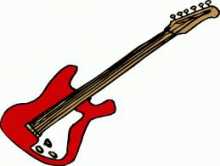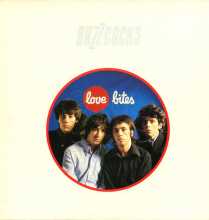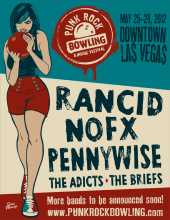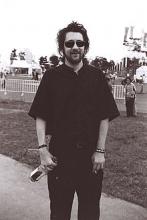There's a reason the Buzzcocks's music continues to play in the soundtracks of feature films to this date. Scatological and puerile as much of their material may be, their sound has hardly aged a day. Throw "Ever Fallen In Love" or "Fast Cars" in a playlist alongside Green Day and the Offspring and see if anyone notices the decade shift. It seems as though pop punk throughout all its generations has remained evolutionary stable, churning itself up again and again in similar forms while hardly ever growing stale. It's the shark of the punk ecosystem. It doesn't change, it doesn't age.
Even now that popular music has split itself into about a billion different sub-genres, bands still find exciting work to be done within the pop punk arena. Just look at the Thermals and their recent theological excavations. They take a sound once reserved for brash adolescent effluence and transform it into a vehicle for philosophical discussion. If anything, pop punk has evolved into something more intelligent, more thoughtful, and more important (if less widely consumed) than it's ever been.
It seems to snake along a contrary path to that of its genre brethren. Hardcore punk was born of political need, as angry commentary at a time that needed youth dissent to be shouted, not sung. Its angst conjured its own breed of intellectual discourse and ultimately housed many progressive political and social movements. Hardcore was a palpable force in a world that was entirely too quiet. So why has it since smoldered down to basement screamo while its candy-coated cousin has taken up the intellectual helm?
Browse what passes for hardcore these days and you'll find very little of the Black Flag, Minor Threat school of thought that helped birth the sound. Even the lingering vegan straight-edge subculture seems to have accepted that its music is little more than a sermon directed at the choir. It's not because the music is too heavy; Pitchfork readers seem to have no problem diving into the latest avant-garde doom metal release, and there's plenty that's loud topping the Hype Machine. But when late emo mangled up both hardcore and pop punk during its brief century-ending run, it seems to have spit out only the latter intact.
It could be because there's really nowhere to go with pop punk. You could consider hardcore to have died off, or you could trace its lineage into the post-hardcore, math-rock, and proto-prog subgenres it spawned. Perhaps it didn't die; perhaps it only fractioned into increasingly minute factions that flash and burn out as quickly as they're invented. Perhaps it's a radioactive isotope, while pop punk is as stable as stable gets. It's the atom you can't split. It's the genre you can't break. The formula is tried, true, and endlessly pleasing no matter what kind of content you layer on top of it.







